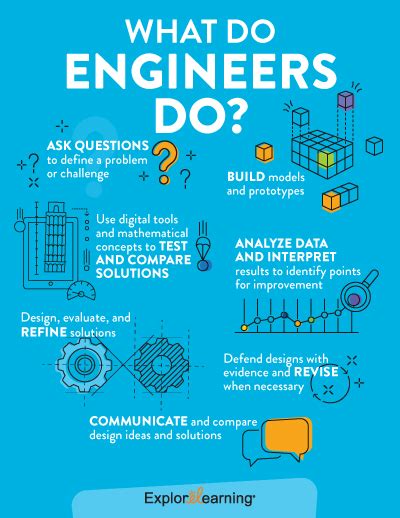Engineers are responsible for designing and building the infrastructure that we rely on every day. They work in a variety of industries, including construction, manufacturing, and transportation.

Some of the most common things that engineers build include:
- Buildings: Engineers design and build all types of buildings, from homes and schools to skyscrapers and bridges. They must consider factors such as safety, structural integrity, and energy efficiency.
- Roads and Bridges: Engineers design and build roads and bridges that connect communities and allow people to travel safely and efficiently. They must consider factors such as traffic volume, weather conditions, and environmental impact.
- Power Plants: Engineers design and build power plants that generate electricity for our homes and businesses. They must consider factors such as fuel efficiency, environmental impact, and reliability.
- Water Treatment Plants: Engineers design and build water treatment plants that clean and purify water for our communities. They must consider factors such as water quality, safety, and environmental impact.
- Transportation Systems: Engineers design and build transportation systems that move people and goods around the country. They must consider factors such as speed, efficiency, and safety.
The Importance of Engineering
Engineering is essential to our modern world. It allows us to build the infrastructure that we need to live and work safely and efficiently. Engineers also play a vital role in developing new technologies that improve our lives.
For example, engineers are working on developing new ways to generate clean energy, reduce pollution, and improve healthcare. They are also developing new technologies that will make our lives easier and more convenient, such as self-driving cars and smart homes.
The Future of Engineering
The future of engineering is bright. There is a growing demand for engineers in all industries. As our world becomes more complex, we will need more engineers to design and build the infrastructure and technologies that we need to meet our challenges.
If you are interested in a career in engineering, there are many resources available to help you get started. You can find more information on engineering programs at colleges and universities, as well as online resources.
How to Become an Engineer
There are many different ways to become an engineer. The most common path is to earn a bachelor’s degree in engineering from an accredited college or university. However, there are also many other ways to enter the engineering field, such as through apprenticeships or by taking online courses.
Once you have completed your education, you will need to pass a licensing exam in order to practice engineering. The licensing exam is administered by the National Council of Examiners for Engineering and Surveying (NCEES).
Tips for Success in Engineering
If you want to be successful in engineering, there are a few things you can do:
- Get a good education. The best way to prepare for a career in engineering is to get a solid education in the field. This includes earning a bachelor’s degree in engineering from an accredited college or university.
- Develop strong problem-solving skills. Engineers are constantly solving problems. In order to be successful, you need to be able to think critically and creatively.
- Be creative. Engineers are always looking for new and innovative ways to solve problems. If you have a creative mind, you will be well-suited for a career in engineering.
- Be a team player. Engineers often work on teams to design and build complex projects. In order to be successful, you need to be able to work well with others.
- Stay up-to-date on the latest technologies. Engineering is a constantly evolving field. In order to stay competitive, you need to stay up-to-date on the latest technologies.
Conclusion
Engineering is a rewarding career that offers a wide range of opportunities. If you are interested in a career in engineering, there are many resources available to help you get started. With a good education and a strong work ethic, you can achieve your goals and make a difference in the world.
Keywords:
- Engineering
- Infrastructure
- Technology
- Problem-solving
- Creativity
- Teamwork
Tables:
| Type of Engineering | Median Annual Salary | Job Outlook |
|---|---|---|
| Civil Engineer | $87,060 | 11% |
| Mechanical Engineer | $88,430 | 9% |
| Electrical Engineer | $91,010 | 7% |
| Chemical Engineer | $100,490 | 5% |
| Computer Engineer | $110,140 | 15% |
| Industry | Number of Engineers Employed |
|---|---|
| Construction | 2.2 million |
| Manufacturing | 1.5 million |
| Transportation | 1.1 million |
| Energy | 500,000 |
| Healthcare | 400,000 |
| Skill | Importance |
|---|---|
| Problem-solving | Very important |
| Creativity | Very important |
| Teamwork | Important |
| Communication | Important |
| Computer skills | Important |
| Pain Point | Motivation |
|---|---|
| Need for more sustainable infrastructure | Develop new ways to generate clean energy and reduce pollution |
| Need for more efficient transportation systems | Develop new technologies to make transportation faster and more efficient |
| Need for improved healthcare technologies | Develop new technologies to improve diagnosis and treatment of diseases |
Tips and Tricks:
- Join professional organizations. Professional organizations can provide you with networking opportunities, continuing education, and career development resources.
- Attend industry conferences. Industry conferences are a great way to learn about the latest technologies and trends in engineering.
- Get involved in research. Research can help you develop new skills and knowledge, and it can also lead to new career opportunities.
- Be a mentor. Mentoring can help you develop your leadership skills and give back to the engineering community.
- Stay positive. Engineering can be a challenging field, but it is also very rewarding. If you stay positive and persistent, you can achieve your goals and make a difference in the world.
